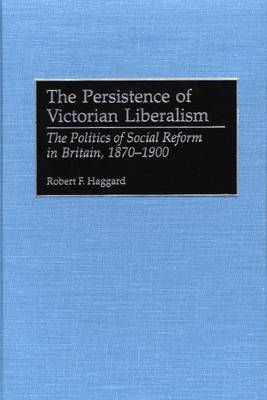
The Persistence of Victorian Liberalism
The Politics of Social Reform in Britain, 1870-1900
Seiten
2000
Praeger Publishers Inc (Verlag)
978-0-313-31305-9 (ISBN)
Praeger Publishers Inc (Verlag)
978-0-313-31305-9 (ISBN)
This study examines the question of where to locate the ideological break between "classical liberalism" and the underlying principles of the modern Welfare State. While most historians of 19th-century Britain argue that such a shift occurred prior to 1900, the author challenges this contention.
The Persistence of Victorian Liberalism examines the question of where to locate the ideological break between classical liberalism and the underlying principles of the modern Welfare State. While most historians of 19th century Britain argue that such a shift occurred prior to 1900, Haggard challenges the contention that classical liberalism had been so undermined by this point that the modern Welfare State was largely inevitable. He considers the public discussion of progress, poverty, charity, socialism, and social reform, and he concludes that the vast majority of the Victorian middle and upper classes remained wedded to the tenets of classical liberalism up to the close of the century.
In contrast to traditional characterizations, Haggard argues that progress, individualism, and character continued to resonate within Victorian society throughout the late Victorian period. Private philanthropy grew increasingly active as a remedy to urban poverty. The London Socialist movement, the New Unionism, the Independent Labour Party, and the New Liberalism, each proponents of socialistic reforms, found themselves marginalized politically. The key to the social debates of the day was the concept of the deserving versus the undeserving poor. Although the deserving might expect some private or public aid, the undeserving were to be punished for their lack of character. Until this notion was overturned, the Welfare State would remain outside the realm of practical politics.
The Persistence of Victorian Liberalism examines the question of where to locate the ideological break between classical liberalism and the underlying principles of the modern Welfare State. While most historians of 19th century Britain argue that such a shift occurred prior to 1900, Haggard challenges the contention that classical liberalism had been so undermined by this point that the modern Welfare State was largely inevitable. He considers the public discussion of progress, poverty, charity, socialism, and social reform, and he concludes that the vast majority of the Victorian middle and upper classes remained wedded to the tenets of classical liberalism up to the close of the century.
In contrast to traditional characterizations, Haggard argues that progress, individualism, and character continued to resonate within Victorian society throughout the late Victorian period. Private philanthropy grew increasingly active as a remedy to urban poverty. The London Socialist movement, the New Unionism, the Independent Labour Party, and the New Liberalism, each proponents of socialistic reforms, found themselves marginalized politically. The key to the social debates of the day was the concept of the deserving versus the undeserving poor. Although the deserving might expect some private or public aid, the undeserving were to be punished for their lack of character. Until this notion was overturned, the Welfare State would remain outside the realm of practical politics.
ROBERT F. HAGGARD is Assistant Professor on the general faculty at the University of Virginia./e
Introduction
The Idea of Progress during the "Great Depression in Trade and Agriculture," 1873-1896
The Revival of the "Condition of England" Question, 1883-1893
The Purification of Philanthropy and the Reform of the Poor Law
Socialist Theory, the Labour Movement, and Social Reform
Conservative, Liberal, and Radical Responses to the Social Question
The Limits of Governmental Intervention during the Victorian Era
The Strange Vitality of Liberal England
Bibliography
Index
| Erscheint lt. Verlag | 30.12.2000 |
|---|---|
| Reihe/Serie | Contributions to the Study of World History |
| Sprache | englisch |
| Maße | 156 x 235 mm |
| Gewicht | 454 g |
| Themenwelt | Geschichte ► Allgemeine Geschichte ► Neuzeit (bis 1918) |
| Geisteswissenschaften ► Geschichte ► Regional- / Ländergeschichte | |
| Geschichte ► Teilgebiete der Geschichte ► Kulturgeschichte | |
| Sozialwissenschaften ► Politik / Verwaltung ► Politische Systeme | |
| Sozialwissenschaften ► Politik / Verwaltung ► Politische Theorie | |
| ISBN-10 | 0-313-31305-9 / 0313313059 |
| ISBN-13 | 978-0-313-31305-9 / 9780313313059 |
| Zustand | Neuware |
| Haben Sie eine Frage zum Produkt? |
Mehr entdecken
aus dem Bereich
aus dem Bereich
Europa 1848/49 und der Kampf für eine neue Welt
Buch | Hardcover (2023)
DVA (Verlag)
CHF 67,20
Giordano Bruno - ein ketzerisches Leben
Buch | Hardcover (2024)
C.H.Beck (Verlag)
CHF 41,85


